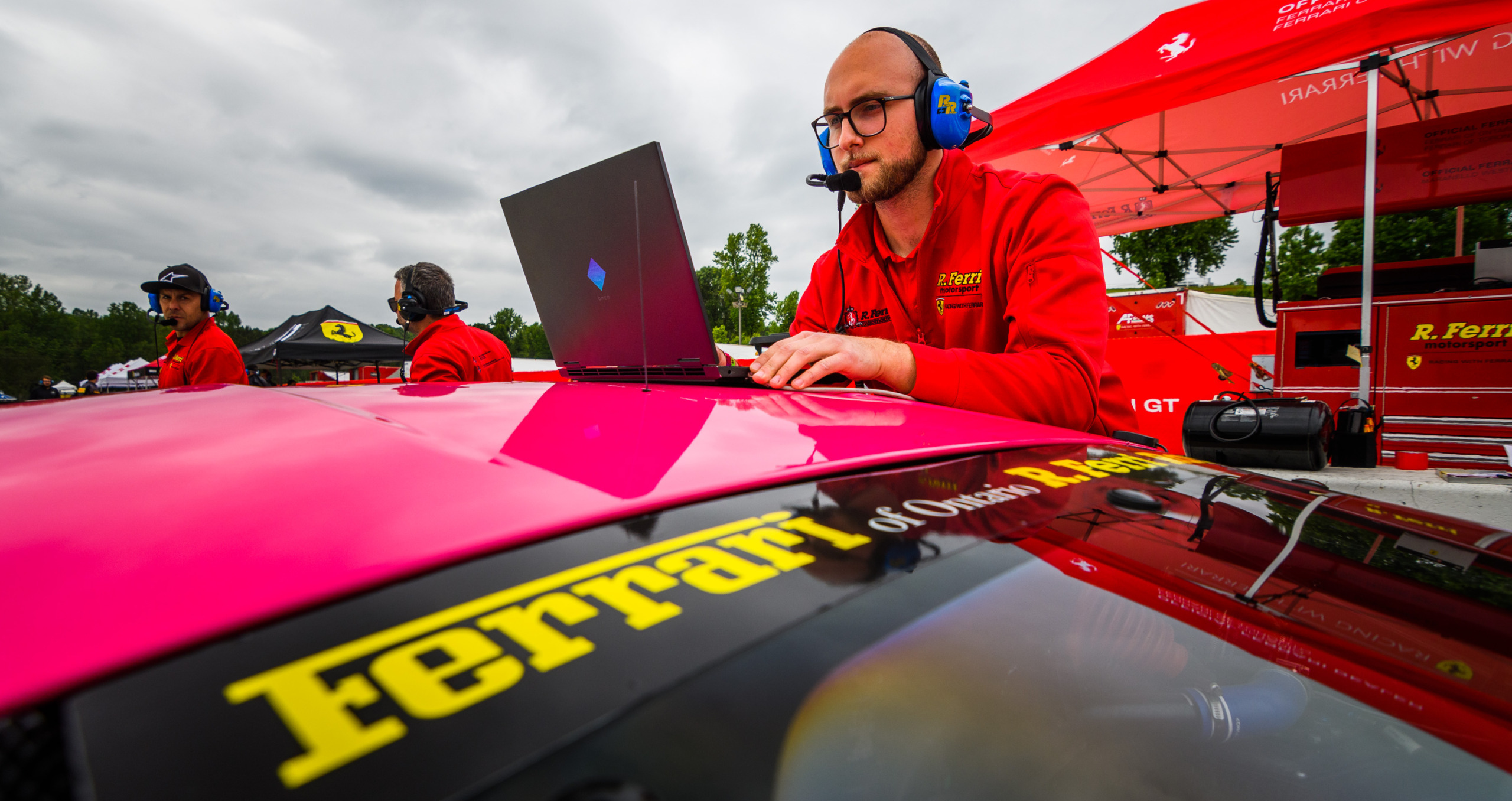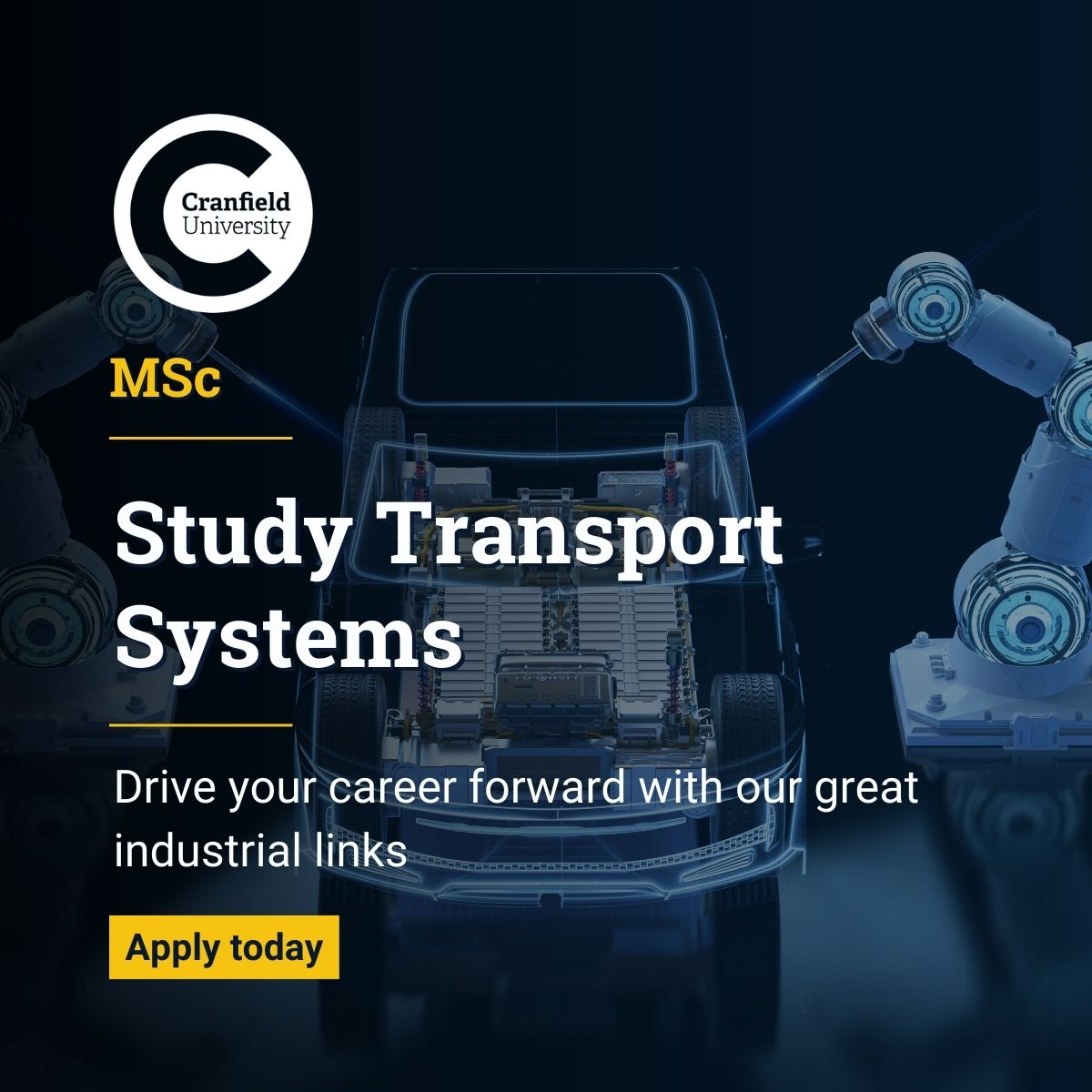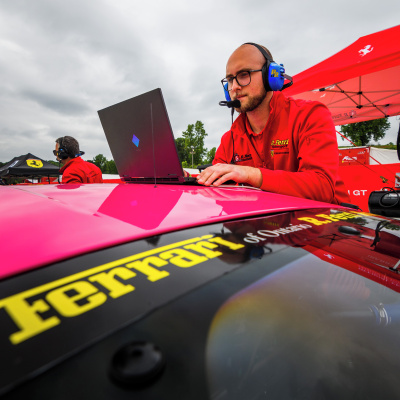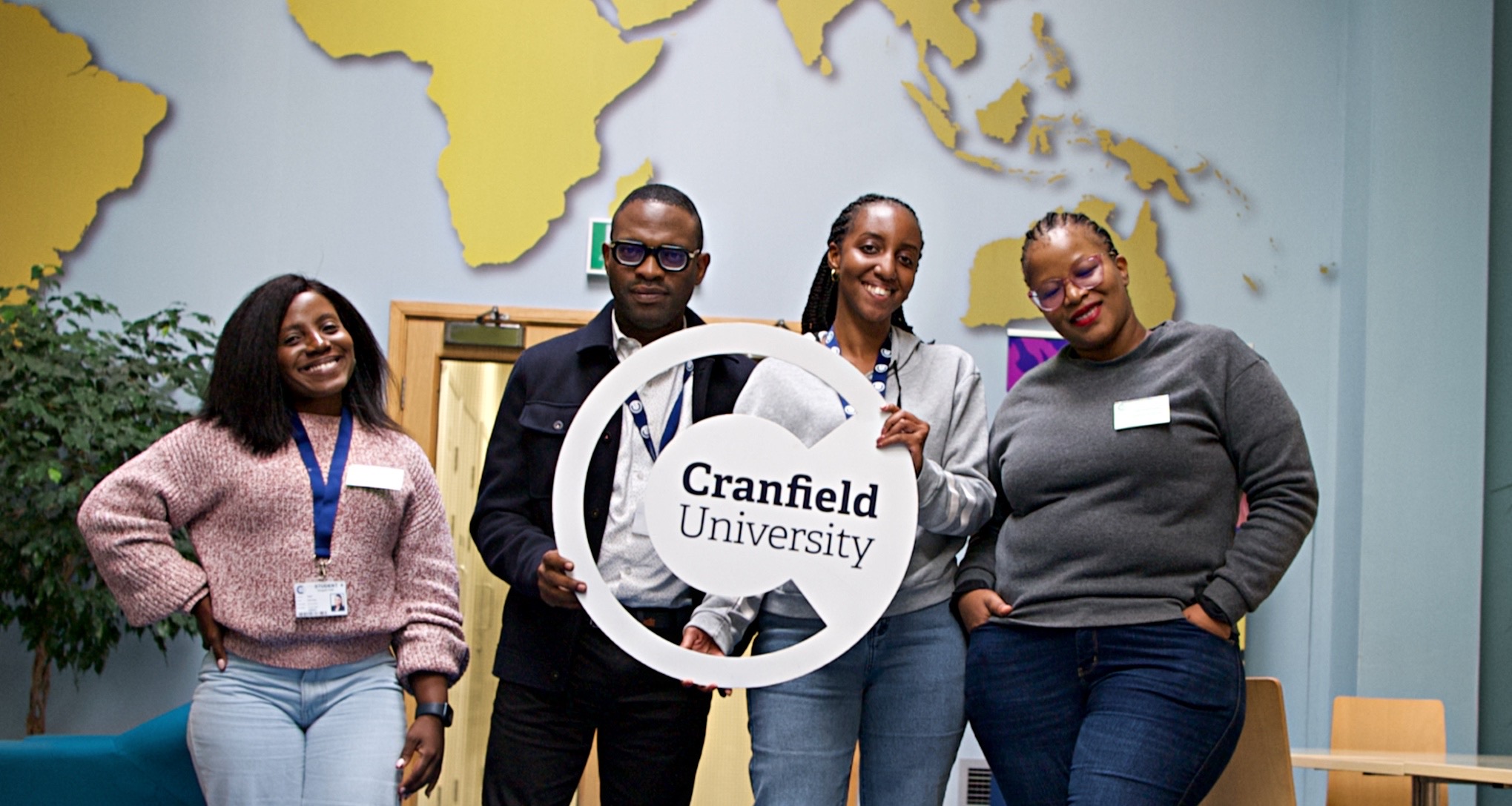Antonio De Sanctis: From Toronto to Trackside with a Passion for Motorsports
15/10/2024

I’m Antonio De Sanctis from Toronto, Canada, and I’m a recent graduate of the world-renowned Cranfield’s Advanced Motorsports Engineering 2023-2024 programme. With four years of professional motorsports experience before attending Cranfield, I used the school year to specialise in certain fields of motorsport that I was most interested in.
Growing up in Toronto, the path of getting into professional motorsports wasn’t very straightforward due to the lack of motorsport involvement in the area. Therefore, I felt as if taking my education and credentials to the next level was essential to finding a role in a high-level motorsport organisation that I would enjoy. When considering my options, it was clear that selecting Cranfield as my school of choice would be a no-brainer. In fact, the Cranfield Advanced Motorsports Engineering programme is the only motorsport programme I had applied to, as I felt it was the only programme worth the sacrifice and time.
Finding my dream school: The power of reputation and resources
To me, Cranfield’s strong reputation and connections to the industry, as well as the staff and facilities it has to offer, make the school a top choice for anyone seriously considering a career in motorsports. The programme was very enjoyable, and the course structure was certainly different to what I had experienced in the past.
Memorable moments: A year of learning and pushing limits
There were many memorable moments from the year, the first of which was the group design project. The challenge, titled a Grand Tour of A Small Island, was a one-day event consisting of rallycross, drag racing, and two endurance races. Each group was tasked with developing a concept to compete in all the events in one day, while still remaining road-legal. The major design decision was centred around how many wheels the group’s concept would have, ranging from 2-4, and the choice was critical as each concept could only use 200kg of rubber over the entire day. My group was the only group to choose a motorcycle as a concept, which allowed me to venture into motorcycle aerodynamic design, as well as some interesting and novel Computational Fluid Dynamics (CFD) methodologies. Everyone walked away from the project having learned something new, which is arguably the most important thing.
Mastering a thesis: Deep dive into aerodynamics and CFD
The second highlight of my year was working on my thesis. I applied RANS transition model and adaptive mesh refinement to deep dynamic stall, and most of my work was completed using OpenFOAM. With the F1 2026 regulations allowing for the actuation of the front and rear wing, I felt as if this topic would better my understanding of not only aerodynamics and CFD but would also allow me to make a novel contribution to my field. Entering the thesis period, I had never used OpenFOAM, but I was fortunate to have a fantastic supervisor, Dr. Teschner, who heads up the Computational Fluid Dynamics MSc (CFD) and who really made the work of my thesis possible in the time span allotted. At its conclusion, it was rewarding to look at a thesis that not only allowed me to specialise in a one of my preferred disciplines, but I also was able to use some novel ideas to suggest some different techniques that teams should use as they approach the next set of regulations.
A day in the life of a Cranfield student: Coffee, routine, and focus
Given that the course structure varies throughout the year, a typical day for me depended on my workload. From October to February, the taught courses had us in class from 9am to sometimes past 5pm, and I would use the evenings to study. From March to May, during the group design phase, I found myself working at home during the day and spending numerous hours at the library at night with my group members. During the thesis period, I mostly worked in my room, but I used some of the picnic tables around campus to work outside and enjoy some of the summer weather. Regardless of my schedule, a typical day on campus for me always started with a double shot of espresso. Coming from Italian heritage, I felt the need to develop a pretty impressive setup in my room, with a café sized coffee grinder, and a Gaggia Classic espresso machine. At home in Toronto, espresso always punctuated different points of the day for me, and no meal was truly over until I had one. Through all the ups and downs of the year, having a ritual of familiarity to come back to always helped keep me sane, and offered some consistency that I really enjoyed. Other than coffee, I always put emphasis on cooking good meals for myself and keeping my space clean. This helped me keep my mind decluttered, something which is important when you spend so much time studying and learning new concepts.
Back on track, bigger dreams
At the moment, I’ve returned to R. Ferri Motorsport as a Race Engineer where I’m helping to build some of the foundations for a future GT programme with the Ferrari 296 GT3. It’s a team that helped me get my first start in motorsport, and they’ve always treated me incredibly well, so I enjoy every day of it. With that said, in a month’s time, I’m very excited to share that I’ll be starting as a Performance Engineer on the Cadillac LMDh programme. This is a dream role for me, and it’s at a level I hoped I’d be working at post-studying at Cranfield. I’m looking forward to being trackside at every IMSA or WEC event and being a part of the driver in the loop simulation sessions. Furthermore, I get to continue to develop my trackside methodologies, while learning from some incredibly knowledgeable and experienced colleagues. I’m a big proponent of continuous learning, even after your schooling is finished, and I know this is a role which will require me to not only learn every day, but to push myself to a new level as we all work towards victory.
Life at Cranfield: Exploring the UK and embracing new experiences
The UK is beautiful, and while attending Cranfield, you’ll certainly have some spare time to travel and experience all of it. Getting into London from campus only takes an hour, which allows for weekend trips when your schedule allows for it. Obviously, the difference in climate from Toronto takes some time to get used to, but it’s not necessarily as bad as everyone makes it out to be.
Looking Forward: Reaching Milestones and Embracing the Journey
In every interview I participated in this past year, I was asked, “Where do you see yourself in the next five years?” My answer to that was always that I wanted to return trackside, potentially in a race or performance engineering position, depending on the series. Currently, I’m on track (pun intended) to do just that, and I’m happy to be reaching some milestones I set out for myself, potentially even earlier than expected. Having goals and aspirations is important, but learning to enjoy the journey and being thankful for where you already are is arguably even more critical. The concept of a goal suggests that, once you reach it, you’ve completed your mission and you’ll be happy because of it. In reality, once you achieve something, you’ll always be left wondering what’s next. It’s imperative that occasionally, you take some time to reflect on where you are, what you’re doing, and to compare how your future looks, to how you expected it to be. If, when I was 18, you would have told me that I would have lived in three countries and studied abroad, all before turning twenty-five, I would have absolutely not believed you.
Advice for aspiring motorsports engineers
Aspire to be the best at what you do, and take things day by day from there, and you might just find yourself in places you would have never imagined. I get weekly messages on LinkedIn asking me how I got into motorsport, and what steps one should take to do the same. In my opinion, you need to exploit what makes you different, and you need to consider what makes you valuable to a team. As one of my previous colleagues explained to me “Everyone wants to get into a racing team saying that they’ll even offer to sweep the floor, but the reality is, there are 100 people lined up to do the same. What do you have to offer?” One of the most important things you can do is understand the fundamentals of the field you’re looking to work in, as no amount of experience can make up for not understanding the basics.
Build a strong foundation
Reading books such as RCVD by Milliken and Milliken, and The Science of Vehicle Dynamics by Massimo Guiggiani are a must. Understanding race car data analysis and the best way to represent a data set, and being fluent in the analysis software is also very important, which is why I recommend the book Analysis Techniques for Racecar Data Acquisition by Jorge Segers.
Develop coding expertise:
Software such as Motec I2Pro, Pi Toolbox, and Bosch WinDarab are free to download and use, and represent the most widely used programmes in the industry. Something that I also believe is very important currently is one’s ability to code. Languages such as MATLAB, C++, Python, and SQL are a good set to start learning. At the highest levels of motorsport, the best teams are consistently creating their own tools, analysis software, and use code to post process data quickly and efficiently. Time is always a luxury in motorsport and taking some of repetitive workload off yourself such as post session KPI plots and basic competitor analysis, can free you up to do other things that require more thought and rigorous analysis. Furthermore, being able to effectively store and manipulate data sets to look at long term trends, and to create empirical correlations for certain parameters, is critical.
Network and show initiative
As for getting into a racing organisation, this can be a bit more difficult. One of the best ways to do so is to show up to your local track during race weekend and speak to team’s face to face while handing out CVs. If you’re competent, highly driven, and willing to learn, you’ll likely find something as teams are always looking for extra help. I got my start volunteering my time, but it paid dividends, and I would not be where I am today without making that initial sacrifice.
The power of teamwork and communication
Also, don’t underestimate the value of taking on other tasks that aren’t engineering related. During my first Ferrari Challenge race weekend, aside from some engineering work, I spent time helping with tyre preparation and refuelling. This helped understand what the roles of my teammates entailed, which now helps me improve my communication as a race engineer. As an example, because of that work, I’m conscious of the time it takes to have a new set of slicks prepared, so I must plan a few sessions ahead with the tyre team to ensure we have the desired tyre sets ready available. Furthermore, I’m aware of the time it takes to pump out and refuel the car, and how gruelling it can be to spend the whole day in a fire suit in the heat of the summer. I also learned that if you show respect for the people you work with, they will show respect for you. After spending time race engineering, you’ll come to realise that how you communicate with your team and remain calm when things don’t go to plan, is just as important as how fancy your Excel spreadsheets are.
Sharing knowledge
A fun fact about me is that I have a motorsport blog that features race engineering focused articles. I have always felt grateful for my previous experiences in racing, and I want to pay that forward by sharing some of my knowledge with others who are as eager to learn as I was when I first started. Writing the articles also allows me to explore new topics, while staying sharp in areas I’m already knowledgeable in. With the research and reading I do in preparation for the post writing; I feels as if it’s an opportunity for me to learn as much as it is to teach others. You can find these posts, as well as more about me, at https://www.adsmotorsports.ca/blog.
Categories & Tags:
Leave a comment on this post:
You might also like…
Commonwealth Scholarships play a critical role in developing sustainability and leadership in Africa
Q&A with Evah Mosetlhane, Sustainability MSc, Commonwealth Distance Learning Scholar What inspired you to pursue the Sustainability MSc at Cranfield? I was inspired to pursue the Sustainability MSc at Cranfield because of the university’s ...
How do I reference a thesis… in the NLM style?
You may be including theses within your research. When you do so you need to treat them in the same way as content taken from any other source, by providing both a citation and a ...
Introducing… Bloomberg Trade Flows
Are you interested in world trade flows? Would it be useful to know which nations are your country's major trading partners? If so, the Bloomberg terminal has a rather nifty function where you can view ...
Cranfield alumni voyage to the International Space Station
Seeing our alumni reach the International Space Station (ISS) has a ripple effect that extends far beyond the space sector. For school students questioning whether science is “for them”, for undergraduates weighing their next ...
From classroom to cockpit: What’s next after Cranfield
The Air Transport Management MSc isn’t just about learning theory — it’s about preparing for a career in the aviation industry. Adit shares his dream job, insights from classmates, and advice for prospective students. ...
Setting up a shared group folder in a reference manager
Many of our students are now busy working on their group projects. One easy way to share references amongst a group is to set up group folders in a reference manager like Mendeley or Zotero. ...









